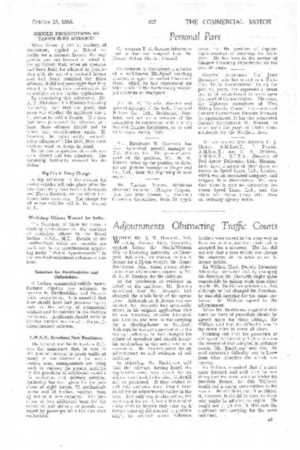Adjournments Obstructing Traffic Courts
Page 39

If you've noticed an error in this article please click here to report it so we can fix it.
WTHEN Mr. J. T. Howarth, 106, VV lifting Avenue East, Liverpool. applied before the North-Western Deputy Licensing Authority, at Liverpool, last week, for renewal of his A licence for a 2i-ton vehicle, Mr. Henry Backliouse, Jun., raised strong objections to an adjournment request by Mr. G. II. P. Beames, for the railways.
At the conclusion of evidence on behalf of the applicant, Mr. Beames submitted that Mr. Howarth had changed the whole basis of his operations. Although an A licence was unlimited, Mr. Howarth had specifically stated in his original application that he was operating between Liverpool and London, and now he was carrying for a clearinghouse to Scotland. Although he was not a newcomer to the haulage industry, he had changed his sphere of operation and should justify his application in the same way as a newcomer. Mr. Beames asked for an adjournment to call evidence of rail facilities.
In objecting, Mr. Backhouse said that the railway, having heard the applicant's case, now asked for an adjournment and, 'in his view, it should not be permitted. If they wished to call this evidence they should have asked for an adjournment earlier in the case. Not only was it obstructing the working of the court, but if this kind of thing were to happen each time an A licence came up for renewal, a position might be reached where A-licence hauliers were routed in the same way as B-licence holders, and that could not be accepted for a moment. The Act did not say that a man should not change the character of his work as an Alicence holder.
Sir William Hart, Deputy Licensing Authority, remarked that by changing his direction Mr. Howarth might quite conceivably he taking work from other people. Mr. Backhouse pointed out that although he had changed his direction. he was still carrying for the same customer. Sir William agreed to the adjournment.
When Mr. Backhouse suggested that some set form of procedure should be agreed upon for these sittings, Sir William said that his difficulty was to lay down rules to cover all cases.
Pointing out that the procedure at sittings of the Licensing Authorities was the reverse of that adopted in ordinary courts, Mr. Backhouse -said that the road operator's difficulty was to know ,from what direction the attack was coping.
Sir William remarked that if a man came forward and said that he was doing just the same work as under his previous licence, he (Sir William) would feel a strong presumption in his favour. He did think that if he altered it, however, it should be open to those who might be affected to object. He would not forget that in this case the applicant was carrying for the same customer.




























































































